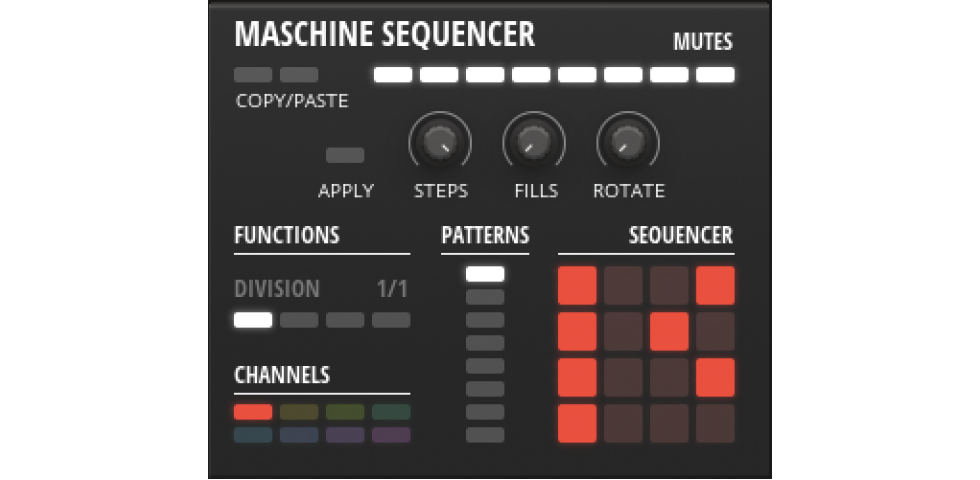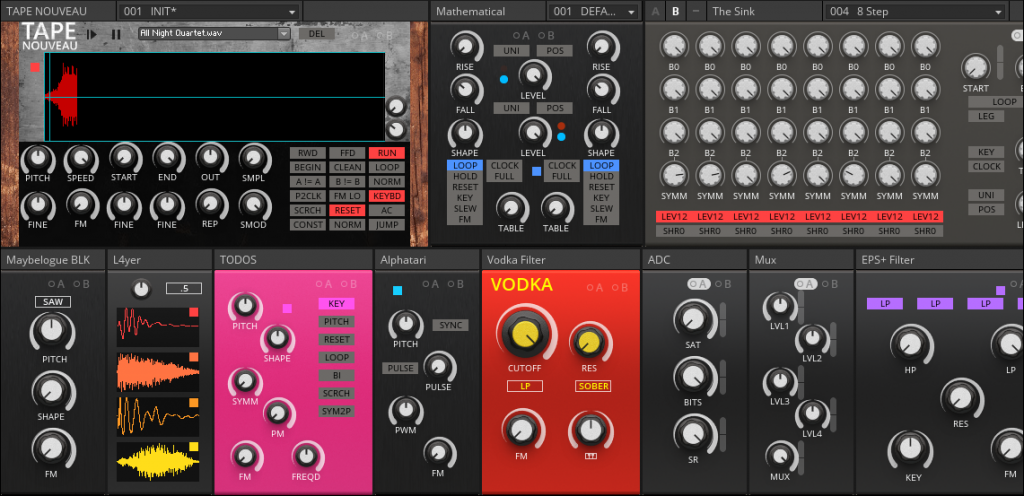Native Instruments keeps adding to Reaktor Blocks, the patch-and-play toolkit they’ve built atop Reaktor. And… it’s turning into kind of an awesome product in its own right. Reaktor Blocks 1.2 adds a bunch of the sort of stuff I think you or I would add to it were we in charge of the product. It’s suddenly got drums. It’s got a new sequencer that you can power with Maschine. It’s connecting via MIDI and CV to outboard gear and analog modular. In short, it’s something you actually want to play with.
1.2 adds a pretty significant set of functionality for free.
Connect analog hardware. If you have compatible gear (you need a DC-coupled converter of some kind, possibly via your audio interface), you can send CV right out of Reaktor to analog hardware like modulars and the like. You can even auto-calibrate and save those calibrations with snapshots.
You can also generate gates and triggers from incoming signals, so that you can integrate modular/analog devices with Reaktor (see the tutorial below). That opens up clock, filter, pitch, envelope, and other applications.
Connect MIDI. You can also convert pitch and gate information to MIDI – which means Reaktor is a CV to MIDI converter if you like (again, once you’ve got the required hardware).

Drum modules! Drums are a new addition – the free Niji Drums give you a mess of drum modules you can add via Blocks.

Play with Maschine
The Maschine sequencer is designed to work with a MK2 controller (not sure how this maps to Maschine Studio). It’s a simple, patchable step sequencer mapped to the 4×4 pad layout of your Maschine hardware – cleverly giving you some easy hands-on control. (It should be short order mapping this to other gear, too, if you desire.)
I’ll be interested to see if there’s other Maschine/Reaktor integration.
The sequencer and modules are downloadable separately, but were developed by NI. (It’s confusing that these aren’t in Service Center, but they’re free – so no complaints.)

The Blocks revolution is on
Native Instruments said they hoped they’d motivate the Reaktor user community to make their own Blocks and – wow, have they ever. There are already over 300 User Library Blocks additions. I’m just starting to mess around with them, but my mind is already boggled at the quantity and variety in there. As if the User Library weren’t already a great reason to delve into Reaktor, Blocks seems to have set the whole community on fire. And once you’ve got a patch as a Block, it’s also easier to work with – combining with other tools is the whole point, and it’s much easier than it had been with traditional Reaktor blocks.
Have a look. Rainy days at the beach, here’s your vacation (you can choose to look at Blocks exclusively if you like):
http://www.native-instruments.com/en/reaktor-community/reaktor-user-library/
Softube recently showed off their upcoming Eurorack emulation tools. That looks really cool, too – near replicas of modular gear will soon be available in plug-in form – and I look forward to trying it. But Reaktor’s approach is unique. It represents the modular, patching paradigm presented in a way that allows for computer-centric experimentation and new creations that wouldn’t necessarily be possible or practical as outboard gear. And the User Library interaction I think is likely to set Reaktor apart. (Of course, these are both reasonable affordable tools, so you might just wind up getting both.)
Learn how to use it
The key to getting started with Blocks is really … getting started with Blocks. Friend of the site Owen Vallis from Kadenze has done just that with a series of how-to’s looking at the hardware integration. Watch:
Also, there are a bunch of insightful videos from the Reaktor Sessions series of events – mixing how-to info with details of how artists are working.
Check those out here:
http://www.native-instruments.com/en/specials/best-of-native-sessions-reaktor/
(And yeah, I’m in some of them, from the edition in Berlin!)
For instance, I really enjoyed learning how Paula Temple works. (I watched a bit of our friend Dasha Rush over her shoulder, which was also impressive!)
And if Paula is inspiring you to take on your own techno DIY endeavors, making your own 909 kick is a great place to start.
With that 909 kick in mind, you can return to our own discussion of generative sequencers. Previously, Nadine showed us how to make a quick mod to get started:
In just a few minutes, mod a Euclidean Sequencer in Reaktor
And now, of course, you can take these Reaktor creations and map them to other controller hardware in Ableton.
It all comes together. Good times.
http://www.native-instruments.com/en/products/komplete/synths/reaktor-6/connect/